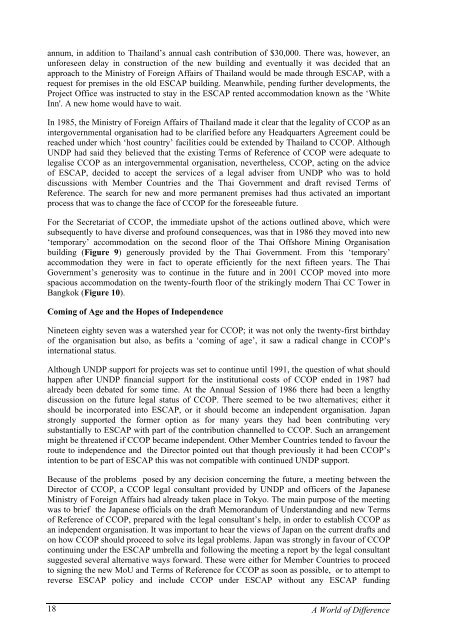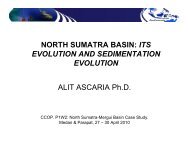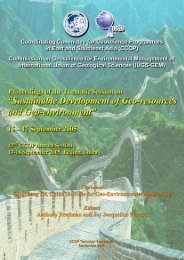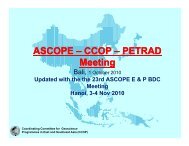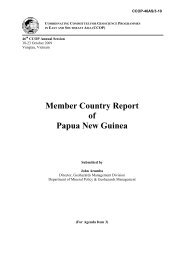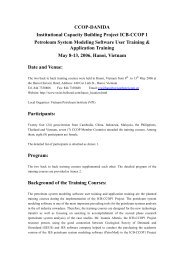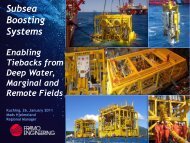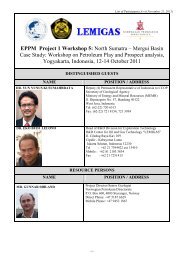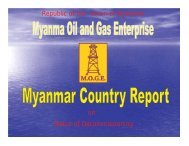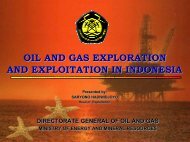Forty Years Of The Coordinating Committee For Geoscience - CCOP
Forty Years Of The Coordinating Committee For Geoscience - CCOP
Forty Years Of The Coordinating Committee For Geoscience - CCOP
You also want an ePaper? Increase the reach of your titles
YUMPU automatically turns print PDFs into web optimized ePapers that Google loves.
annum, in addition to Thailand’s annual cash contribution of $30,000. <strong>The</strong>re was, however, an<br />
unforeseen delay in construction of the new building and eventually it was decided that an<br />
approach to the Ministry of <strong>For</strong>eign Affairs of Thailand would be made through ESCAP, with a<br />
request for premises in the old ESCAP building. Meanwhile, pending further developments, the<br />
Project <strong>Of</strong>fice was instructed to stay in the ESCAP rented accommodation known as the ‘White<br />
Inn'. A new home would have to wait.<br />
In 1985, the Ministry of <strong>For</strong>eign Affairs of Thailand made it clear that the legality of <strong>CCOP</strong> as an<br />
intergovernmental organisation had to be clarified before any Headquarters Agreement could be<br />
reached under which ‘host country’ facilities could be extended by Thailand to <strong>CCOP</strong>. Although<br />
UNDP had said they believed that the existing Terms of Reference of <strong>CCOP</strong> were adequate to<br />
legalise <strong>CCOP</strong> as an intergovernmental organisation, nevertheless, <strong>CCOP</strong>, acting on the advice<br />
of ESCAP, decided to accept the services of a legal adviser from UNDP who was to hold<br />
discussions with Member Countries and the Thai Government and draft revised Terms of<br />
Reference. <strong>The</strong> search for new and more permanent premises had thus activated an important<br />
process that was to change the face of <strong>CCOP</strong> for the foreseeable future.<br />
<strong>For</strong> the Secretariat of <strong>CCOP</strong>, the immediate upshot of the actions outlined above, which were<br />
subsequently to have diverse and profound consequences, was that in 1986 they moved into new<br />
‘temporary’ accommodation on the second floor of the Thai <strong>Of</strong>fshore Mining Organisation<br />
building (Figure 9) generously provided by the Thai Government. From this ‘temporary’<br />
accommodation they were in fact to operate efficiently for the next fifteen years. <strong>The</strong> Thai<br />
Government’s generosity was to continue in the future and in 2001 <strong>CCOP</strong> moved into more<br />
spacious accommodation on the twenty-fourth floor of the strikingly modern Thai CC Tower in<br />
Bangkok (Figure 10).<br />
Coming of Age and the Hopes of Independence<br />
Nineteen eighty seven was a watershed year for <strong>CCOP</strong>; it was not only the twenty-first birthday<br />
of the organisation but also, as befits a ‘coming of age’, it saw a radical change in <strong>CCOP</strong>’s<br />
international status.<br />
Although UNDP support for projects was set to continue until 1991, the question of what should<br />
happen after UNDP financial support for the institutional costs of <strong>CCOP</strong> ended in 1987 had<br />
already been debated for some time. At the Annual Session of 1986 there had been a lengthy<br />
discussion on the future legal status of <strong>CCOP</strong>. <strong>The</strong>re seemed to be two alternatives; either it<br />
should be incorporated into ESCAP, or it should become an independent organisation. Japan<br />
strongly supported the former option as for many years they had been contributing very<br />
substantially to ESCAP with part of the contribution channelled to <strong>CCOP</strong>. Such an arrangement<br />
might be threatened if <strong>CCOP</strong> became independent. Other Member Countries tended to favour the<br />
route to independence and the Director pointed out that though previously it had been <strong>CCOP</strong>’s<br />
intention to be part of ESCAP this was not compatible with continued UNDP support.<br />
Because of the problems posed by any decision concerning the future, a meeting between the<br />
Director of <strong>CCOP</strong>, a <strong>CCOP</strong> legal consultant provided by UNDP and officers of the Japanese<br />
Ministry of <strong>For</strong>eign Affairs had already taken place in Tokyo. <strong>The</strong> main purpose of the meeting<br />
was to brief the Japanese officials on the draft Memorandum of Understanding and new Terms<br />
of Reference of <strong>CCOP</strong>, prepared with the legal consultant’s help, in order to establish <strong>CCOP</strong> as<br />
an independent organisation. It was important to hear the views of Japan on the current drafts and<br />
on how <strong>CCOP</strong> should proceed to solve its legal problems. Japan was strongly in favour of <strong>CCOP</strong><br />
continuing under the ESCAP umbrella and following the meeting a report by the legal consultant<br />
suggested several alternative ways forward. <strong>The</strong>se were either for Member Countries to proceed<br />
to signing the new MoU and Terms of Reference for <strong>CCOP</strong> as soon as possible, or to attempt to<br />
reverse ESCAP policy and include <strong>CCOP</strong> under ESCAP without any ESCAP funding<br />
18<br />
A World of Difference


